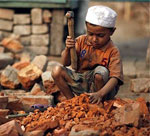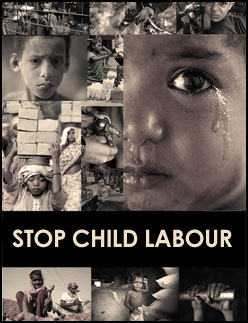Case Studies – All India Anti Crime Bureau
- Child Labour: Child labour refers to the employment of children in any work that deprives children of
 their childhood, interferes with their ability to attend regular school, and that is mentally, physically, socially or morally dangerous and harmful. This practice is considered exploitative by many international organizations. Legislations across the world prohibit child labour.
their childhood, interferes with their ability to attend regular school, and that is mentally, physically, socially or morally dangerous and harmful. This practice is considered exploitative by many international organizations. Legislations across the world prohibit child labour.
India is sadly the home to the largest number of child labourers in the world. The census found an increase in the number of child labourers from 11.28 million in 1991 to 12.59 million in 2001. 40% of the labour in a precious stone cutting sector is children. NGOs have discovered the use of child labourers in mining industry in Bellary District in Karnataka in spite of a harsh ban on the same. In urban areas there is a high employment of children in the zari and embroidery industry.
In 2000 the ILO estimated 5.5 million children had been forced in labour in Asia, while the Bonded Labour Liberation Front placed 10 million bonded children in India alone. In 1998 the government of India labelled bonded child labour as a marginal problem with only 3000 or so cases. A survey in Tamil Nadu in 1995 found 125,000 bonded child labourers in the state alone. Child bonded labour in India is mostly in the agricultural sector but has in recent times been moving into other sectors as well such as beedi-rolling, brick kilns, carpet weaving, commercial sexual exploitation, construction, fireworks and matches factories, hotels, hybrid cottonseed production, leather, mines, quarries, silk, synthetic gems, etc.
- Cheating & Fraud: Fraud is a deception deliberately practiced in order to obtain some benefit or advantage
 to which they are not otherwise entitled or someone knowingly denies some benefit that is due and to which some one is entitled.There is no separate legislation dealing with fraud as in the United Kingdom or the USA. Fraudulent activities are covered by the Indian Penal on 25 defines the expression ‘fraudulently’ – a person is said to do a thing fraudulently if he does that with intent to defraud but not otherwise. The expression fraudulently occurs in Sections 206, 207, 208, 242, 246, 247, 252, 253, 261, 262, 263 and Sections 421 to 424. Sections 24 and 23 define expressions ‘dishonestly’ and ‘wrongful gain and wrongful loss’. ‘Wrongful gain’ is gain by unlawful means of property which the person gaining is not legally entitled. ‘Wrongful loss’ is the loss by unlawful means of property to which the person losing it is legally entitled. Whoever does anything with the intention of causing wrongful gain to one person or wrongful loss to another person, is said to do that thing ‘dishonestly’.
to which they are not otherwise entitled or someone knowingly denies some benefit that is due and to which some one is entitled.There is no separate legislation dealing with fraud as in the United Kingdom or the USA. Fraudulent activities are covered by the Indian Penal on 25 defines the expression ‘fraudulently’ – a person is said to do a thing fraudulently if he does that with intent to defraud but not otherwise. The expression fraudulently occurs in Sections 206, 207, 208, 242, 246, 247, 252, 253, 261, 262, 263 and Sections 421 to 424. Sections 24 and 23 define expressions ‘dishonestly’ and ‘wrongful gain and wrongful loss’. ‘Wrongful gain’ is gain by unlawful means of property which the person gaining is not legally entitled. ‘Wrongful loss’ is the loss by unlawful means of property to which the person losing it is legally entitled. Whoever does anything with the intention of causing wrongful gain to one person or wrongful loss to another person, is said to do that thing ‘dishonestly’.
- Property Grabbing: Legislation should define and address property grabbing perpetrated against a widow by her in-laws and/or other community members. Drafters should either adopt a specific and comprehensive offense for property grabbing or address it through other related offenses.
 A specific offense of property grabbing should define it as the taking of property of a deceased person from the surviving wife and/or children to whom it rightly belongs. Such property may include the marital home, land, and any other moveable or non-moveable property. Other related offenses include theft, embezzlement or conversion, unauthorized use, and criminal trespass, as well as attempts thereof. Legislation should also address the physical violence or threats that may accompany property grabbing.Legislation should also address other insidious forms of property grabbing, such as adverse possession tactics. Legislation should describe adverse possession as an act by which one party possesses the land of another until she or he can claim legal title to it. Generally, the elements may require possession to be real, open, notorious, exclusive, hostile, under the guise of a claim or right, continuous and uninterrupted for a specific time period. Drafters should ensure that a definition is sufficiently broad to encompass different adverse possession tactics. For example, the deceased’s relatives may plant crops on the fringe of a widow’s land to shift boundaries which may constitute an attempt to adversely possess a portion of her land.
A specific offense of property grabbing should define it as the taking of property of a deceased person from the surviving wife and/or children to whom it rightly belongs. Such property may include the marital home, land, and any other moveable or non-moveable property. Other related offenses include theft, embezzlement or conversion, unauthorized use, and criminal trespass, as well as attempts thereof. Legislation should also address the physical violence or threats that may accompany property grabbing.Legislation should also address other insidious forms of property grabbing, such as adverse possession tactics. Legislation should describe adverse possession as an act by which one party possesses the land of another until she or he can claim legal title to it. Generally, the elements may require possession to be real, open, notorious, exclusive, hostile, under the guise of a claim or right, continuous and uninterrupted for a specific time period. Drafters should ensure that a definition is sufficiently broad to encompass different adverse possession tactics. For example, the deceased’s relatives may plant crops on the fringe of a widow’s land to shift boundaries which may constitute an attempt to adversely possess a portion of her land.
















